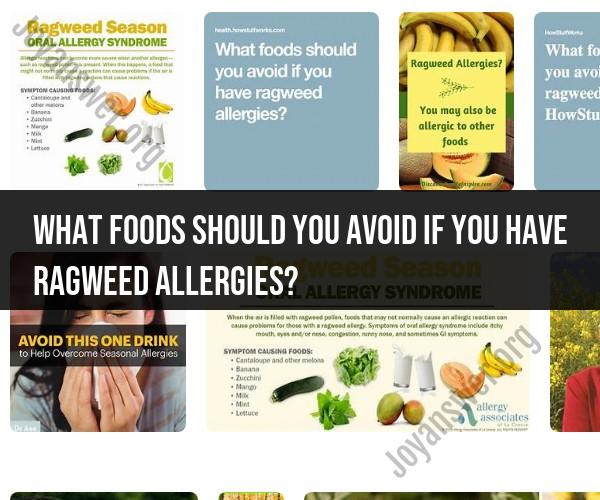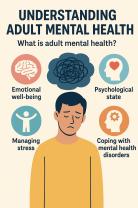What foods should you avoid if you have ragweed allergies?
If you have ragweed allergies, you may experience cross-reactivity with certain foods, particularly fruits and vegetables. This is because some proteins in these foods are structurally similar to the proteins found in ragweed pollen. When your immune system recognizes these similar proteins, it can trigger allergy-like symptoms in response to consuming these foods. This condition is known as oral allergy syndrome (OAS) or pollen-food syndrome.
Common foods that individuals with ragweed allergies may want to avoid or be cautious with due to the potential for cross-reactivity include:
- Bananas
- Melons (cantaloupe, watermelon, honeydew)
- Zucchini
- Cucumbers
- Raspberries
- Chamomile tea
- Sunflower seeds
- Echinacea supplements
- Artichokes
It's important to note that not everyone with ragweed allergies will experience cross-reactivity with these foods, and the severity of symptoms can vary. Additionally, cooking or peeling some of these foods may reduce the risk of triggering a reaction because the proteins responsible for OAS are often broken down by heat or enzymes in the digestive system.
If you have ragweed allergies and are concerned about cross-reactivity with certain foods, consider the following tips:
Consult an Allergist: If you suspect you have OAS or are concerned about specific food allergies related to ragweed, consult an allergist for testing and guidance.
Allergen Avoidance: If you've experienced symptoms of cross-reactivity with certain foods, you may choose to avoid or limit your consumption of those foods, especially during ragweed pollen season.
Cooking or Peeling: Cooking or peeling fruits and vegetables may help break down the proteins responsible for OAS and reduce the risk of a reaction.
Allergy Medications: Over-the-counter or prescription antihistamines can help manage mild allergy symptoms. Consult a healthcare professional for appropriate medications.
Be Informed: Stay informed about the cross-reactivity potential of foods associated with ragweed allergies, and be cautious when trying new foods.
Individual Variation: Keep in mind that individuals may have varying degrees of sensitivity to cross-reactive foods, so what triggers a reaction in one person may not affect another.
If you suspect you have OAS or have experienced allergic reactions to specific foods, it's essential to seek guidance from an allergist or healthcare professional who can provide accurate diagnosis, testing, and personalized recommendations for managing your allergies.
Managing Ragweed Allergies: Foods to Avoid and Allergen Triggers
Ragweed allergies are a common type of seasonal allergy. Ragweed pollen is released into the air in the late summer and early fall, and it can cause a variety of symptoms, including sneezing, runny nose, itchy eyes, and difficulty breathing.
There is no cure for ragweed allergies, but there are things you can do to manage your symptoms, such as avoiding ragweed pollen and taking over-the-counter or prescription medications.
Foods to Avoid
In addition to avoiding ragweed pollen, people with ragweed allergies may also need to avoid certain foods. These foods are known as cross-reactive foods, and they can trigger allergic reactions in people who are allergic to ragweed.
Some common cross-reactive foods for people with ragweed allergies include:
- Bananas
- Cantaloupes
- Cucumbers
- Honeydew melons
- Watermelons
- Zucchini
- Sunflower seeds
If you have ragweed allergies and you experience any allergic symptoms after eating any of these foods, it is important to avoid them.
Allergen Triggers
In addition to foods, there are other allergens that can trigger ragweed allergy symptoms. These allergens include:
- Dust mites
- Mold
- Pollen from other plants, such as grasses and trees
It is important to be aware of these allergens and to take steps to avoid them. For example, you can dust your home regularly to remove dust mites, and you can avoid spending time outdoors on days when the pollen count is high.
Managing Your Ragweed Allergies
If you have ragweed allergies, there are a number of things you can do to manage your symptoms:
- Avoid ragweed pollen and cross-reactive foods.
- Take over-the-counter or prescription medications as needed.
- Use an air purifier in your home.
- Take a shower after being outdoors to remove pollen from your skin and hair.
- Wear sunglasses and a hat to protect your eyes and nose from pollen.
If you have severe ragweed allergies, you may want to consider immunotherapy (allergy shots). Immunotherapy can help to desensitize you to ragweed pollen and reduce your symptoms.
By following these tips, you can manage your ragweed allergies and enjoy your fall season.













